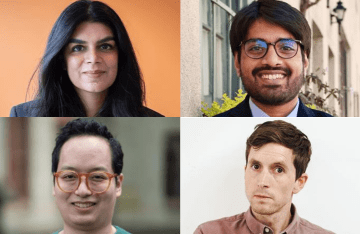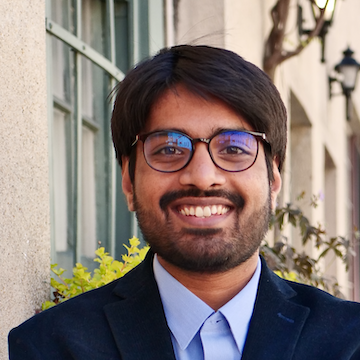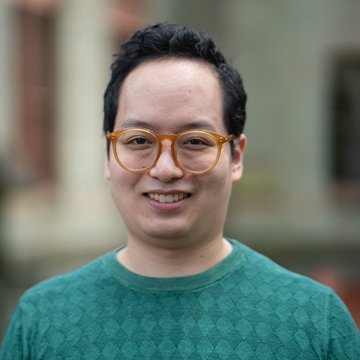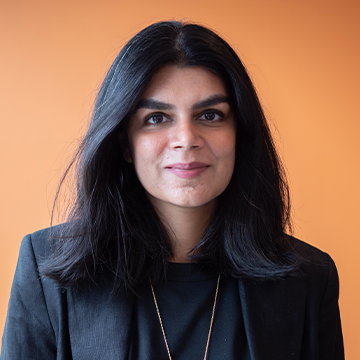
CARGC & C3 Postdoc Colloquium
- Annenberg School for Communication, Room 500
- Zoom
This colloquium will feature presentations by Sandeep Mertia, Matt Parker, Arthur Z. Wang, and Zehra Husain - followed by a Q&A with the audience.
This event is part of the Center for Advanced Research in Global Communication (CARGC) and the Annenberg Center for Collaborative Communication (Annenberg C3) co-sponsored event series.
Schedule and Presentations
2:00 - 3:25 pm | Presentations by Sandeep Mertia and Matt Parker followed by Q&A
The State in/as the Stack: The Dreamwork of Digital Public Infrastructures in Startup India
Presenter: Sandeep Mertia, Postdoctoral Fellow, Center for Advanced Research in Global Communication and Center on Digital Culture and Society
Abstract: In most of the world, the state is the biggest builder and/or broker of digital futures. The Indian government’s ‘Startup India’ program, which was launched in 2016, now has 1,20,000+ registered start-ups; many of them also supported by allied initiatives of state governments across small cities. Based on over two years of ethnographic and archival research, my work explores how futuristic narratives of digital capitalism are re-assembled at a human scale in postcolonial and global South contexts.
In this presentation, I focus on digital public infrastructures that enable the state and start-ups to interface with each other and with growing collectives of smartphone users to cultivate data and aspirational subjectivity as raw materials for future-making. Thinking through the many gaps between the grand visions of these infrastructures and their materially patchy and economically loss-making lives in practice, I argue for a critical interfacial understanding of data, value, and power in imaginaries of global and planetary-scale computing.
Wavefield~Fieldwork: How landscapes become stories of technology
Presenter: Matt Parker, Gilbert Seldes Multimodal Postdoctoral Fellow
Abstract: This presentation offers an introduction to my book project Wavefield~Fieldwork: How landscapes become stories of technology. My work reveals the histories of technology embedded within the geographical and cultural terrains of the present by exploring the curious lives of electromagnetic waves, subsea telecommunication cables, castaways, piezoelectricity, 5G, mass bird mortalities, wellness crystals, and sound baths.
Wavefield~Fieldwork explores fieldwork as an artistic research practice that considers the complexities of planetary scale communication technologies within culturally specific ecologies. It offers a careful reminder that to imagine technological landscapes of the future, we must first be able to tell stories of those landscapes’ past.
3:25 - 3:35 pm | Break
3:35 - 5:00 pm | Presentations by Arthur Z. Wang and Zehra Husain followed by Q&A
Escape Velocity: Grounded Afrofuturism and the Life Media of Black Space Scientists
Presenter: Arthur Wang, Provost’s Postdoctoral Fellow
Abstract: This presentation examines biographical media by and about African American space scientists as an alternative to two longstanding visions of race in the cosmos: a progressive model of outer space as utopian departure from earthly oppression and a cyclical model of outer space as defamiliarized recapitulation of historical violence and inequality. Across memoirs, documentaries, profiles, and interviews of Black astronauts and astrophysicists, this talk elaborates a common mode of ironic speculation that draws as much from commentary and criticism in the Black press as it does from Black science fiction.
This work also advances a broader study of the scientific biography’s negotiation between an ideal of scientific impersonality and a hunger for scientists’ life stories in academic and popular cultures. While biographer Ira B. Nadel has suggested that the genre’s appeal relies on a formally conservative insistence on the "coherence of life and comprehensibility of experience," this collection of biographical media instead frames scientific lives through dissonant juxtapositions between Afrofuturist wonder and the earthly politics of stargazing while Black.
Muhammad Ali’s Appearances: Imagining the Nation, Fashioning the Self
Presenter: Zehra Husain, Postdoctoral Fellow, Center for Advanced Research in Global Communication
Abstract: This presentation explores the circulating images of legendary boxer Muhammad Ali in mainstream news media and in Lyari Town, a working-class neighborhood in Pakistan’s commercial hub, Karachi. It shows the different scales on which Muhammad Ali’s image operates, beginning with the very personal, where people gain prestige and fashion themselves as local, notable figures of Afro-Baluch descent through their proximity with Ali. Muhammad Ali as an icon also works on a wider, national scale, in Pakistan promoting a “soft diplomacy,” and containing both religious value as a Muslim and secular value as an athlete. By exploring the ways in which Ali appears in the mainstream media, the presentation argues that Muhammad Ali’s status as icon entails a contingent excess. Every new appearance and iteration of Muhammad Ali pulls his image into a new direction. Instead of mere repetition, an icon contains the potential for transformation, as it is drawn into both macro (national) and micro (personal) projects of self-fashioning.
About the Speakers

Sandeep Mertia is an incoming Assistant Professor of STS at the Stevens Institute of Technology. He is currently a Postdoctoral Fellow at the Center for Advanced Research in Global Communication and the Center on Digital Culture & Society, Annenberg School of Communication, University of Pennsylvania. He completed his Ph.D. with Distinction at the Department of Media, Culture, and Communication, New York University in summer 2023. He is an ICT engineer by training and former Research Associate at Sarai-CSDS, New Delhi. His publications include Lives of Data: Essays on Computational Cultures from India (2020). His research has been supported by the National Science Foundation and NYU’s inaugural Urban Doctoral Fellowship, among others.

Matt Parker is a critical sound explorer; an artist researching the resonances between things. His multimedia works are influenced by the practice of listening; to unsound vibratory ecologies and the economies of noise. His research engages with the environmental humanities through sound studies, field recording, ethnography, and STS, to create a multimodal spectral art practice.
Matt has a Ph.D. on the topic of listening, fieldwork, and media infrastructure ecology from the London College of Communication, UAL; a master’s in music technology from the Royal Birmingham Conservatoire; and a bachelor’s in philosophy and psychology from the University of Leeds. He is currently the Gilbert Seldes Multimodal Postdoctoral Fellow in the Annenberg School of Communication at the University of Pennsylvania.

Arthur Wang is a Provost’s Postdoctoral Fellow at the Annenberg School for Communication, University of Pennsylvania. His research and teaching focus on contemporary fiction, scientific rhetoric about race and gender, and media and health humanities. He co-edits Post45, an open-access peer-reviewed journal for scholarship on contemporary literature and culture, and previously worked as a software developer.

Zehra Husain is a cultural anthropologist specializing in media, race, and popular culture. Her research studies people’s uptake of popular images as they shape racial subjectivities and cosmopolitan imaginaries in the Indian Ocean region. Her book manuscript project analyzes the resonances of boxing, soccer, and rap music in a port neighborhood in Karachi. It traces the circulation of global African American and afro diasporic icons in national mainstream media and in people’s image-making practices. These visual and aural media, she argues, are valorized resources through which a non-elite people, many of whom are of afro-Baluch descent, draw resonances and similarities between seemingly unrelated contexts. In so doing, people rework racialized stigmas related to urban violence, criminality, and lower caste status and reconfigure Indian Ocean’s cosmopolitan aesthetics with global blackness. Zehra is also working on a second research project on Indian Ocean screen cultures. She has previously worked as a journalist in Karachi.
Events
View AllDisclaimer: This event may be photographed and/or video recorded for archival, educational, and related promotional purposes. We also may share these video recordings through Annenberg's website or related platforms. Certain events may also be livestreamed. By attending or participating in this event, you are giving your consent to be photographed and/or video recorded and you are waiving any and all claims regarding the use of your image by the Annenberg School for Communication. The Annenberg School for Communication, at its discretion, may provide a copy of the photos/footage upon written request.
